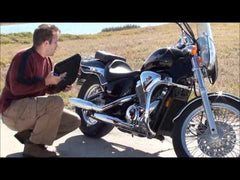New Year's Resolution: Learn to Ride! How to do it Right!

Have you been thinking about getting a motorcycle and/or learning to ride? Does the idea of riding free on two wheels make you smile? Have you seen bikers go by and wondered what you were missing? Or maybe you just want to save a little gas on your commute?
Whatever your reasons for wanting to ride, we want to help you with a few pointers. If you are a new rider there are some important things you should know before getting in that seat.
Step One: Take a class.
Maybe you’re thinking, ‘my husband/brother/boyfriend rides a motorcycle, he can teach me.’ Well, maybe he can, but it may not be a good idea. It’s better to find a teacher who’s not too intimately involved with you. He/she will be more impartial and less nervous about what you are doing.
I can’t say enough about the Motorcycle Safety Foundation Riding Course. I took it years ago, and when I married I insisted my husband take it, too (because *I* didn’t want to teach him!).
An added bonus to the course is that in most states, you can take the license exam at the conclusion of the course. In addition, in some states passing the MSF course qualifies you for discounts on insurance. AND the MSF course can be completed in one weekend.
You may be able to find other riding classes offered for free, but even if there’s a cost, it’s money well spent. Try google to search out classes offered in your area.
I believe so strongly in getting some basic training that you notice I listed this as Step ONE, and then...
Step Two: Get licensed.
Does a motorcycle endorsement on the piece of plastic in your wallet make your riding skills sharper? Of course not.
The real reason licensed riders are less likely to crash is because of their attitude, not their license status. Riders who take motorcycling seriously, ride legally, ride sober, and try to continuously improve their riding skills are more likely to have long and happy riding careers. It's all about attitude.
Step three: Choose the right bike for you.
Everyone has that dream bike. The one they picture in their mind’s eye riding down the road.
However, your dream bike may not be the best choice for your first bike. Why, you ask? I can think of a couple reasons:

- You may drop it. Everyone does when they are first learning. Wouldn’t you rather drop a bike that you are less emotionally and financially attached to?
- What you think you want now may not be what you want later. You’ll get a better idea of what you really want only after you’ve ridden a while and gotten some experience. No reason to fork out a ton of money only to find out a year later it doesn’t really suit your needs.
One more note: don’t go too big right away (especially women). A big motorcycle can intimidate a new rider and make you uncomfortable, and soon you’ll find yourself less enthusiastic about riding. And we don’t want that!
Get the smaller bike, and just know that at some point, you’ll want to ‘step up’ to a bigger machine. Trust me - you’ll know when the time is right.
Step Four: The gear.
It’s not just about the motorcycle; you need the right gear.
A helmet and gloves are a good start (and in my opinion, absolutely required). I have personally found a good set of boots to be crucial - you don’t want to find your feet slipping when you’re trying to stop or move the bike. Also, think about getting a jacket and pants specifically made for riding.
Gearing up right doesn't have to be expensive. You should always buy a helmet NEW, because crash damage to the interior can be undetectable to anyone but an expert. But it’s easy to find gently used riding pants, boots, gloves and jackets. Many retailers and online mail-order houses offer discounts on sell-outs and non-current styles.
Step five: Find like minded people to ride with.
 Motorcycling is a social activity. There are tons of groups out there. You can always find people on Internet Message Boards. Just do a search by the brand or type of motorcycle that interests you and see what you find.
Motorcycling is a social activity. There are tons of groups out there. You can always find people on Internet Message Boards. Just do a search by the brand or type of motorcycle that interests you and see what you find.
Meeting other riders will introduce you to a level of camaraderie that's uncommon these days. Riding with responsible, experienced riders can help you improve your own skills - and it’s the icing on the cake!
- Tracey Cramer





